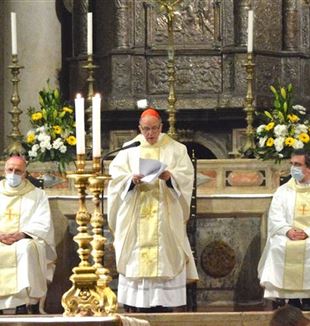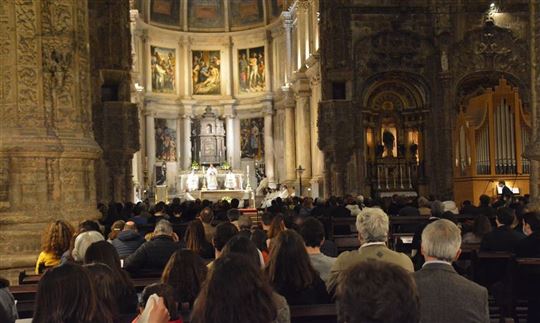
"He proposed the essential of Christianity, Christ”
The homily of Cardinal Manuel Clemente, Patriarch of Lisbon, during mass for Fr. Giussani’s anniversary. Santa Maria de Belém, Lisbon, February 22, 2022.I associate myself with conviction and pleasure to the memory of Monsignor Luigi Giussani, on the seventeenth anniversary of his death and the fortieth anniversary of the pontifical recognition of the Fraternity of Communion and Liberation.
The celebration of the feast of the Chair of St. Peter, that is, of the central role that the Apostle and his successors play in the service of ecclesial unity – which "presides in charity" as St. Ignatius described the Church of Rome at the beginning of the second century - strengthens further the memory we have.
In fact, throughout the journey that led to the recognition of Giussani's charism and work, his constant link with the succession of popes stands out, particularly to St. Paul VI and St. John Paul II. He also had a close bond, close affinity, with Cardinal Ratzinger, the future Benedict XVI, without forgetting Cardinal Bergoglio, Archbishop of Buenos Aires and current Pope Francis, who did not fail to share publicly what he owes to reading of Giussani’s books.
The dialogue we have just heard in the Gospel illustrates to us in a particularly striking way the Christian fact, why it is essential and decisive. Jesus asks his disciples who man says He is. The answers come one after the other, identifying him with ancient or recent biblical figures, which resurface in Him. Jesus insists on the question, involving them more directly. It is then that Simon Peter declares, "You are the Christ, the Son of the living God!" To which Jesus replies, "Blessed are you, Simon son of Jonah, for this was not revealed to you by flesh and blood, but by my Father in heaven. And I tell you, you are Peter, and on this rock I will build my Church..."
Peter's faith, the divine light that led him to confess Jesus as the Messiah (Christ) and Son of the living God, is the solid rock on which the Church is founded and which will resist every evil that will come. And so whatever is bound and loosed on earth will be bound or loosed in Heaven. Let us dwell a little longer on what happened to Peter and what certainly happens to us here, enlightened by the same faith. Peter found himself faced with the concrete humanity of Jesus, who had called him to the shores of the lake and who so corresponded to the messianic expectations of the people at that time. And it was precisely because of this that he perceived something much greater, namely, the very divinity of the one who had called him: "You are the Christ, the Son of the living God!"
What happens with Peter, and what continues with us is an amazing thing if perceived with Christian realism. In childhood, or later, we were told about Jesus, about what He said and did during the initial part of His mission and with the people He met. Gradually or more quickly, the question about His person grew in us, as He draws us to Himself two millennia later. Life itself, where our deepest desires reside, has begun to refer to Him, who conquers us because He convinces us. We feel Him as a presence now and not as a mere memory of what He was then. We confirm all of this with the same conviction of the faithful community – a community that is born precisely from this common faith, which God alone grants. We thus also come to understand ourselves, what each of us must be and do, always starting from Him.
The beginning of Giussani's priestly life coincided with a profound and important change in society and in religious practice. The post-war period also transformed many ways of living and co-existing, particularly, especially in large urban and industrial areas. People moved not only in search of work, but also changed their outlook and mentality, weakening the usual ties of the transmission of faith and religious practice.
Dedicating himself with enthusiasm to the education of young students, Giussani found himself faced with a barrier of negative concepts and prejudices against the Catholic faith, now aggravated, but resulting from unresolved disputes between reason and religion, between freedom and morality, between secularism and confessionalism, between a compact here, and an evanescent beyond.
Within this context, he proposed the essential of Christianity, that is, Christ, as the answer that does not deceive the humanity He shares, as the Incarnate Word of God, but responds in superabundance to all that we most strongly and deeply desire. As he wrote at the time, Christ “is right here, in my attitude and disposition as a human being, in my way, that is, as one who extracts, awaits something, because I sense that I am entirely lacking in everything. He has joined me. He has proposed himself to my original needs […] To take into considerations means to take seriously what we experience, everything, we experience, to discover every aspect, to seek the complete meaning (quoted in Alberto Savorana, The Life of Luigi Giussani, 2018, McGill-Queen’s University Press, p. 256). It is precisely here that Luigi Giussani's most original and significant contribution resides. He does not evade any question, nor does he remove any problem, but he gathers what lies within them, with the desire for more and for better, to correspond to the person of Christ and to what he offers us, so divinely human, so humanly divine.
The modern world is more complex than previous eras, with all that it brings us within a cascade of possibilities and promises, both practical and mental. Attracted or distracted by so many real or apparent possibilities, we run the risk of remaining within an opaque reality, stuck between immediate need and illusory seduction.
Needs and seductions were not lacking two thousand years ago either, in a mixture of religious and political motivations, as was the case of anti-Roman messianism that would have moved Peter himself at that moment. Jesus does not evade any question asked of Him, but always leads us to what matters most, that is, to the ultimate meaning of what one does or does not do, converting desires and behaviors.
Thus, he awakens the truly religious sense of life, which means our relationship with God, ultimately sufficient for every human heart, in a humanity to which Jesus restores all its greatness, guaranteed by His paschal sacrifice and sustained communally.
This is what Giussani said during the St. John Paul II’s memorable meeting with ecclesial movements on May 30, 1998, explaining the only reason for full and reasonable joy for humanity at all times: "Because that Man, Jesus of Nazareth, is the Reality on which all the positivity of every man’s existence depends. Every earthly experience lived in the Spirit of Jesus, blossoms in Eternity. This blossoming will not blossom only at the end of time; it has already begun on the dawn of Easter [...] and experience possible for ordinary man, in the radical change that He produces in the one who encounters Him, and, like John and Andrew, follows Him [the first to be called in St. John's Gospel]. Thus for me the grace of Jesus has become the experience of a faith that in the Holy Church, that is to say the Christian People, revealed itself as a call to feed a new Israel of God.”
It is thus, starting from this conviction, that all that Giussani offered to the Church has sprung, in the renewed awareness that the encounter with Christ corresponds to the deepest yearning of the human heart. Nothing is evaded, everything is clarified, in the face of the astonishing truth that things acquire in Him and with Him, the Word of God incarnate.
Read also - "His intuition: bring Christ back to the center of human experience”
To conclude, I choose the words of the current Pope Francis, from when he was Archbishop of Buenos Aires, on April 27, 2001, during the presentation of another book by Giussani. Speaking of the reasons for his gratitude to the author, he said, "The first and more personal one is the good that this man has done me, in my life as a priest, through the reading of his books and articles. The second reason is that I am convinced that his thought is profoundly human and reaches man’s innermost longings. I dare say that this is the most profound, and at the same time understandable, phenomenology of nostalgia […] nóstos algos, the feeling called home, the experience of feeling attracted to what is most proper for us, most consonant with our being. In the context of Fr. Giussani’s reflections, we encounter instances of a real phenomenology of nostalgia.” We understand "nostalgia" as a nostalgia for the house where the Father of every prodigal son is always waiting for us.
I thank God for having given us Luigi Giussani, in that time which was his and continues to be ours. Through what he has accomplished and written, he has made us relive what Peter and others experienced that day in Caesarea Philippi, so far away and so close to where we are now: confessing Christ to be the total response to the deepest and most inescapable desire of every human heart, fully human, to the point that all we truly desire is a longing for what only culminates in God.#100Initiatives